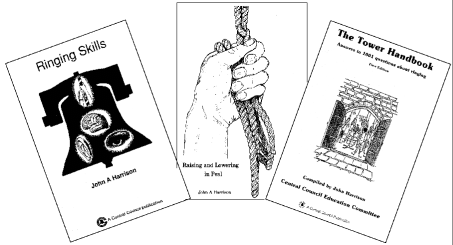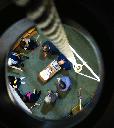
 The first stage is learning to handle a bell. Think of it as a bit like learning to stay on a bike safely. These initial lessons are hands-on, with your tutor closely supervising you.
The first stage is learning to handle a bell. Think of it as a bit like learning to stay on a bike safely. These initial lessons are hands-on, with your tutor closely supervising you. Satisfaction features strongly among the reasons that people take up ringing. It is a skilled activity and there is a natural satisfaction in mastering the skills and being able to perform well, especially since it is a team activity where you all help each other to achieve the overall result – a buzz for all of you. Ringing uses a unique combination of skills – physical control like riding a bike combined with precision dynamics like say tennis and a whole body rhythm a bit like ballroom dancing. On top of that the mental skill of knowing 'what' to do has no direct equivalent in any other music or sport but has an alure of its own.
Once you can control a bell competently, the opportunities open up, with different methods to learn, different bells to ring, different towers to visit and different people to meet. What you achieve, and how much you get out of ringing, is as much as you want. The world is your oyster in terms of where you ring, and you will never exhaust what is available in terms of technical challenge. Not everyone ascends the heights of course. Many ringers are happy with the satisfaction of ringing well and enjoying the friendship of other ringers. But there is always more if you want it.
Becoming a ringer also opens up a host of related areas including training, conducting, composing, tower management, bell maintenance, and promoting the richness of ringing to non-ringers. In subjects like ringing history or theory you can dip your toes out of simple fascination or you can get deeply involved and help to push back the boundaries of knowledge.
Some of the things ringers say about why they started:
"I live across the road and hear the ringing. I thought I would like to be involved".
"My children learnt to ring, and I thought if they can, so can I".
"The tower was short of ringers , so I had a go. Then I got hooked".
"I went along out of curiosity, had a go, and never looked back".
"It's nice to be helping to keep such a valuable tradition alive".
"I married a ringer, and realised I would see more of her if I rang too".
"It's something I always thought about doing, but never got round to until now".
"I learnt to ring years ago, but it's like riding a bike, you never completely forget, so now I've got more time, I took it up again".

 The first stage is learning to handle a bell. Think of it as a bit like learning to stay on a bike safely. These initial lessons are hands-on, with your tutor closely supervising you.
The first stage is learning to handle a bell. Think of it as a bit like learning to stay on a bike safely. These initial lessons are hands-on, with your tutor closely supervising you.
When you can handle the bell safely, you need further exercises to learn how to control the bell, to make it ring faster or slower. (Think of it as like learning to cycle in a straight line, and turn corners when required.)
Thus far, you have been ringing a bell on its own. The next step is learning to synchronise the timing of your bell with others. (Think of it as cycling in formation, six or eight abreast.) You might do this initially with the aid of a simulator, but in due course you will be ringing with a room full of other ringers.

This is what it is all about, and when you can do it reasonably well, you will be expected to take part in regular performances ringing before services and at other times such as weddings.
 Most of the rest of your training will be in general practices with the rest of the band. They, as well as you, will have things they want to achieve so the time in practices is shared out, with each piece of ringing (a 'touch') intended to benefit different people. A lot of a ringer's time is spent ringing things to help a fellow ringer. At first, you will mainly be a beneficiary, but as you progress, you will increasingly be able to ring things that help other people.
Most of the rest of your training will be in general practices with the rest of the band. They, as well as you, will have things they want to achieve so the time in practices is shared out, with each piece of ringing (a 'touch') intended to benefit different people. A lot of a ringer's time is spent ringing things to help a fellow ringer. At first, you will mainly be a beneficiary, but as you progress, you will increasingly be able to ring things that help other people.
Although at this stage you have become 'a ringer', it is only the start of a journey where you go on to develop your skills and interests, and you will be encouraged to progress further.
The next step is into change ringing, where you learn to ring in continually changing sequences called methods. You can think of learning methods as like an instrumental player learning new pieces of music. You start with very simple things, and progress to more complex ones. How far you progress is largely up to you. We have a fairly extensive repertoire, and there are even greater opportunities if you want to progress even further.
For young ringers, going to university can be a huge boost. Many university ringing societies are extremely active.
How long does it take to learn? How long is a piece of string! There is no 'normal' time. Your rate of progress will depend on a lot of things: individual aptitudes, how regularly training takes place, how long training sessions are, how easy the bells are, and so on.
 There are many training publications available for ringers. These are just three (written by an All Saints ringer). Click here to see a ringing bibliography .
There are many training publications available for ringers. These are just three (written by an All Saints ringer). Click here to see a ringing bibliography .
 As well as practical experience, you will be coached in the theory of learning and ringing methods. For example, we sometimes use small handbells to help teach the principles of change ringing without the need to control a full size bell at the same time. That's what was happening in this unusual picture looking down on the ringers during an enforced interlude in a practice while a rope was changed.
As well as practical experience, you will be coached in the theory of learning and ringing methods. For example, we sometimes use small handbells to help teach the principles of change ringing without the need to control a full size bell at the same time. That's what was happening in this unusual picture looking down on the ringers during an enforced interlude in a practice while a rope was changed.
 There's no time like the present. You can learn to ring at any age. We have taught nine year olds, people in their fifties, and most ages in between.
There's no time like the present. You can learn to ring at any age. We have taught nine year olds, people in their fifties, and most ages in between.
It may take a little longer as you get older, but aptitude and attitude can have a bigger effect than just age. Some of our fastest learners were in their 30s at the time.
Ringing is a lifelong activity – some people continue ringing into their nineties – so there is plenty of time to reap the rewards of learning. Ringers come in all sizes too, as can be seen from this picture of our recruits a few years ago.
As a trainee ringer at All Saints, you will be allocated to one of our experienced tutors, with individual tuition sessions arranged as often as is convenient for you both. More than once a week will help you to make better progress but we are flexible. When you can ring with the rest of the band, you will be expected to attend practices regularly (on Monday evenings). We also encourage you to come to the pre-practice sessions where you can continue to develop your individual skills, and we may arrange additional training sessions at other times.
When you can ring rounds reliably, you will be expected to play your part in all regular ringing (mainly Sunday morning and evening see full details of ringing times ). You will also be eligible to take part in wedding ringing, for which there is a modest payment (but it might not seem so modest if you are still at school!). You will also take part in outings, and other events.
If you are interested in learning to ring, or if you are just curious to know more about what is involved, then please contact us .
| Back to Top | Back to Ringing at All Saints | Return to Home page | Feedback |